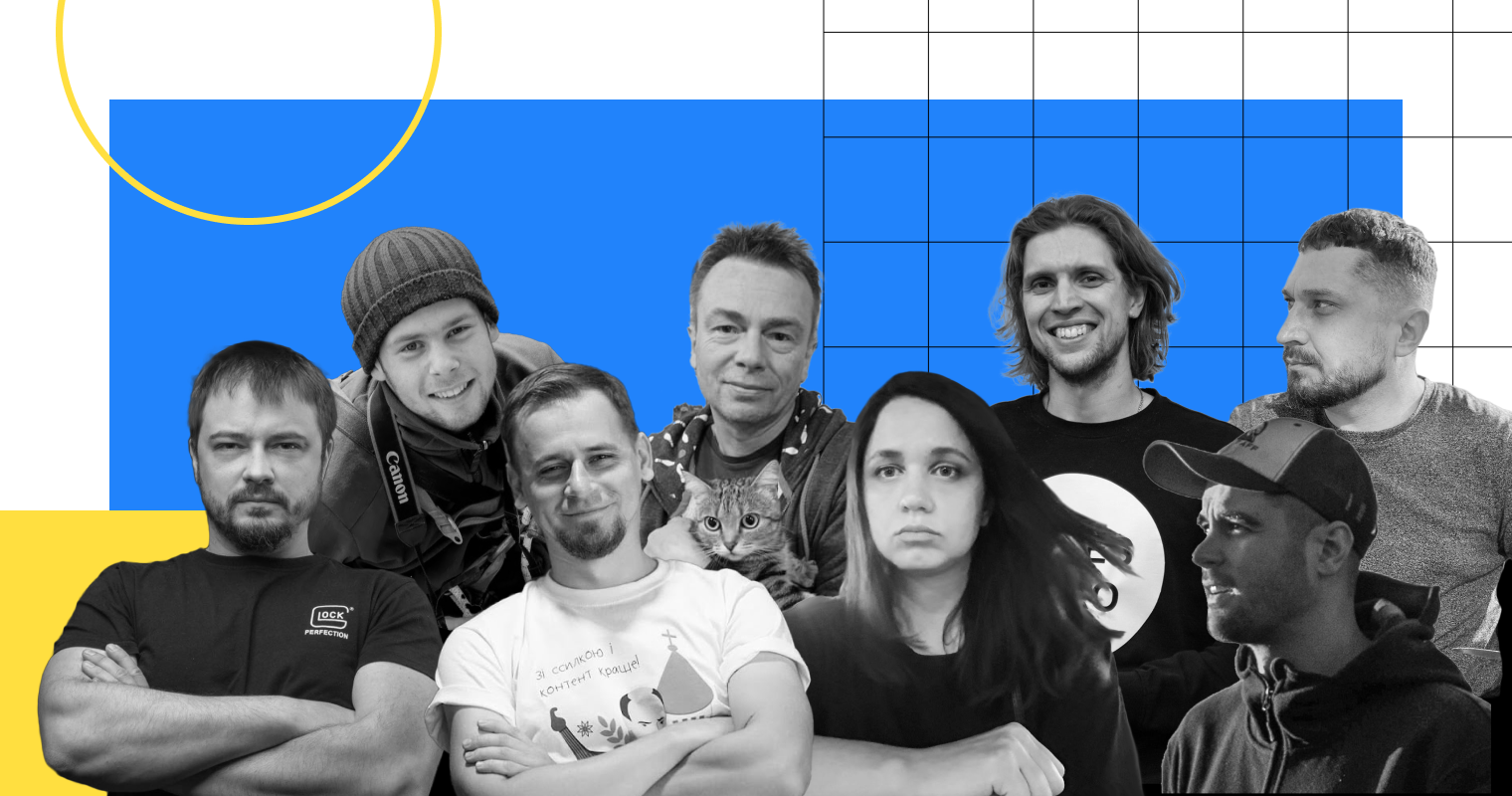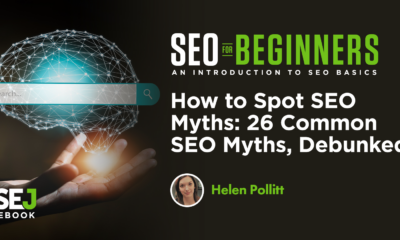SEO
8 Stories Of Hope From The SEO Community

February 23, 2022, was a regular Wednesday for Ukrainian marketers and SEO specialists.
We had our morning coffees and did tech audits, built some links, and revamped a couple of landing pages.
We were striving for better visibility and conversions, trying hard to keep up with the deadlines, and hoping to reach our KPIs.
Then, on February 24, the whole of Ukraine woke up in a newly fragile and terrifying world.
Our plans, aspirations, and priorities were transformed.
From that day on, the only thing that mattered was saving the lives of our families, helping those in need to survive the turmoil of war, and defending our right to live freely on our own land.
For this column, my team reached out to eight Ukrainian SEO and marketing specialists and asked them to share their experiences in the time since our world turned upside down.
It turns out they all had one thing in common: in a shattered world full of painful uncertainty, they’ve drawn strength from helping others and contributing to Ukraine’s future victory.
Here is how they’re doing it.
Bringing Accurate News To Russian People
Artem Pylypets is the Head of SEO at SEO7, lecturer, and the founder of an educational YouTube channel “Школа SEO” (SEO School).
Before the war started, Artem’s life was all about doing SEO himself and sharing his knowledge with others.
He led the SEO department at SEO7, ran his YouTube channel called “Школа SEO” (“SEO School), and conducted online training on SEO matters.
Currently, Artem is doing all the same things, but to the sound of artillery shelling.
War brought many challenges to his work. SEO7 team members are now scattered across Europe since many people had to flee their homes.
They are trying to streamline their operations, but it isn’t easy.
Besides, many SEO7 customers seized their operations, which left the team struggling to stay afloat with the few clients who target the U.S. and European markets.
Artem himself stayed in the Kyiv suburbs. He confessed that he is used to hearing artillery shelling and added that it is “not that heavy.”
His neighborhood community has set up roadblocks, and people guard them in shifts to control the situation.
-
Image source: Author. The photo on the left was taken three months before the war started. Artem’s T-shirt says, “Content gets better if it comes with a backlink.” The photo on the right shows a roadblock with sandbags, one of Artem’s new workplaces.
“It really pleases me to see how the war united my fellow Ukrainians. The way we help each other, the way we fight for our land, is just amazing.
At the same time, I must admit that I’d rather have a peaceful sky above my head.”
Like many other SEO specialists, Artem decided to use his SEO skills to help Ukraine win the informational war.
His goal is to help Russian search engine users see the true stories of war and not the deceitful official propaganda. For this to happen, he has been working on improving the visibility of international media in the Russian SERPs.
When the war ends, Artem plans to keep building his business and hopes to launch all the projects he always wanted to but never had the time for.
He’s looking forward to reading some good news – not reporting on mounting casualties and destruction in Kharkiv, Sumy, Chernihiv, Mariupol, and other cities.
All he dreams of is celebrating Ukraine’s victory with his closest friends.
Volunteering 24/7 To Help Those In Need
Andrey Kapeltsov is the founder of SEO.Capital and a keynote speaker at leading SEO, Affiliate, and iGaming conferences in Ukraine. He has spent the last 18 years mastering SEO and is always looking for new out-of-the-box ways to keep up with search algorithm updates.
Since 2015, he’s focused on the iGaming industry, working as the CMO at major gaming and betting companies.
Because of the specific nature of the iGaming niche, SEO has always been at the core of every marketing strategy Andrey developed.
Today, Andrey is trying to serve his country and people in every way possible.
Some of his company’s employees lived in the cities ravaged by the Russian army – Andrey helped them escape to a safer place.
Today, he continues to help evacuate people from the shelled cities on the frontline to a place to live in the central and western parts of Ukraine.
With employees moved to safe places, Andrey decided to restore his company’s operations to support Ukraine’s economy – his business provides donations to the Ukrainian armed forces.
Also, they’ve established a charity foundation to support displaced families and volunteers.
In addition to helping out financially, Andrey and his colleagues spend their evenings at humanitarian aid centers unloading goods.
Andrey says that this kind of physical activity works just as well as going to the gym.
-
 Image source: Author. Andrey’s portrait in peaceful times and photos from current volunteer activities.
Image source: Author. Andrey’s portrait in peaceful times and photos from current volunteer activities.
“What fascinates me is how the war forced us to quickly establish complex processes – it seemed unachievable in times of peace.
I still sometimes face difficulties finding particular military equipment, but my friends and new acquaintances always help me out.
I had the pleasure of meeting so many great people over the past weeks.”
Andrey notes that his life before the war started seems very distant and blurred. He has a feeling that war lasts forever but has found a role that works for him and is ready to carry on.
When it’s all over, Andrey plans to keep developing his business and actively participate in helping Ukraine recover.
He hopes to spend some time living by the sea, where the only sound would be that of the sea waves. But first, Ukraine has to win.
Helping Ukrainian SEOs Find New Jobs
Olesia Korobka is an SEO entrepreneur running multiple projects before the war started. She offered guidance and consulting to businesses and ran a couple of her own projects sponsored by third parties.
Unfortunately, she had to stop working with most sponsors because of their country of origin.
That left her with mostly consulting. She can now keep up with the tasks, but for a while could not work because of a slow internet connection.
Olesia, her son, and her mother were among the 4 million Ukrainians who had to flee their homes.
First, they moved to Poland and then to the Netherlands, where she could get back to work, which she admitted was challenging.
“My brain was reluctant to focus on complex technical tasks.
After operating in survival mode for a while, the first time I looked into coding, I spent several hours on a task that took me 5 to 15 minutes before, and I still wasn’t sure if I did it right.”
At the same time, working on her projects was something she needed badly. It was the only thing that helped Olesia feel she was doing okay and making a positive impact.
-
 Image source: Author. A selfie made from the life ‘before’ on the left, another selfie made on a bus to Amsterdam (right), and a photo taken at a refugee center.
Image source: Author. A selfie made from the life ‘before’ on the left, another selfie made on a bus to Amsterdam (right), and a photo taken at a refugee center.
What inspired her was the new project she organized to support the Ukrainian SEO community. Since the war started, many people have approached Olesia asking for help finding a new job. Many Ukrainian SEO specialists lost their only source of income and felt desperate.
This is how Olesia got the idea to create a listing of Ukrainian SEOs that briefly describes their skills and areas of expertise.
She contacted Aleyda Solis with a request to share the listing on her Twitter and in the #SEOFOMO newsletter, and Aleyda kindly supported the initiative.
Then, Olesia started receiving messages from different companies open to hiring Ukrainians, so she compiled a listing of job openings.
As more and more experts and businesses joined the initiative, the spreadsheet became messy. So, Olesia is currently working on creating multiple websites targeting employers in Australia, the USA, and particular European countries.
Once the sites are up and running, the job-seeking and hiring process should be much easier.
Olesia dreams of the war coming to an end so that she can return home.
She misses her normal life and the people.
Olesia adds that many Ukrainians will have to deal with PTSD once the war is over and won’t lead a normal life anytime soon.
However, she is determined to keep her chin up and carry on with her projects. Olesia is also grateful to everyone who’s supported her in the past weeks.
“Soooooo many people are helping me. It was amazing and kind of even uncomfortable. I’ve never had that in my entire life and never expected that.
I kind of feel a bit guilty, but also very grateful. Thank you all for your support and input.
I cannot always find the proper words to thank everyone, but I’m super grateful for everything.”
Saving Ukrainian Four-Legged Cuties
Anton Shulke is the Head of Influencer marketing at Duda.co and livestream production manager.
Since 2015, Anton has held live events, webinars, and podcasts for leading companies in the SEO industry, such as Duda, Semrush, and Kalicube.
Duda – Anton’s latest workplace – is not a Ukrainian company and wasn’t directly affected (even though the company had about a dozen employees in Ukraine).
Anton was offered paid time off when the war started, but he prefers to keep working, so he is still doing one webinar a week.
On top of that, Anton joined the Ukrainian SEO community to help the affected people by trying to arrange accommodation, find job opportunities, or provide direct financial help.
Anton was amazed by the reaction of the Ukrainian SEO community. He always believed there were many good people but didn’t expect to see such overwhelming support for the less fortunate ones.
Anton added that he felt honored to be a part of it.
He also started a small charity project for collecting funds for cat and dog shelters, which you can learn about and support here.
“I decided to help small shelters because I thought they could be under the radar of big charities, which tend to help children, refugees, and the army.
I get messages from people who run the shelters, and they seem to be surprised and extremely grateful for the help I provide, which gives me motivation to continue.
The hard part is that while initially the reaction from people was very positive and giving, donations are drying up as time passes.
Still, I understand that people get tired, and I cannot blame them.”
-
 Image source: Author. Anton with his cat and having his traditional morning coffee
Image source: Author. Anton with his cat and having his traditional morning coffee
Anton hopes to keep his job at Duda, but he also considers putting more effort into the charity initiative.
He will probably keep the cat and dog shelter project, though the format may change.
Another thing he hopes to do is have a coffee with all the lovely people who message him on Facebook.
Every day, Anton publishes a ‘Good Morning’ post with a #coffeeshot on his Facebook page. In reply, many people say they’d love to have a coffee with him.
Protecting Ukrainian Land In The Armed Forces
Eugene Lata is the CMO at Lemon.io and an experienced marketer who has spent the last seven years building marketing teams and developing growth strategies.
Up until January 2022, he was the CMO at SerpStat, an SEO tool company based in Odesa.
He had begun a new job at the Lemon.io marketplace not long before the war started.
In the first days of the war, Eugene decided to join Odesa territorial defense forces, and currently, he is a member of the 122nd brigade.
Due to Eugene’s previous experience, he became a managing paramedic officer in the material supply squadron.
This means he is in charge of training other paramedics and forming special evacuation and emergency brigades.
Such brigades consist of one paramedic and four assault soldiers. They work on the frontline evacuating wounded soldiers and civilians.
Luckily, at the moment, there is no need to evacuate civilians in the regions where Eugene is located.
In addition to training paramedics, he trains various military units on NATO’s methodology of providing first aid.
-
 Image source: Author. Eugene serving in the territorial defense forces and a photo of him and his labrador dog before the war started
Image source: Author. Eugene serving in the territorial defense forces and a photo of him and his labrador dog before the war started
This is not the first time Eugene decided to join the army. Back in 2014, after coming back home from the U.K., he spent six months in the Donbas region fighting the enemies with other volunteers who joined the Dnipro-1 battalion.
This was when he started helping wounded people as a paramedic.
Eight years later, his previous experience allowed Eugene to teach other officers to save lives.
“What inspires me is the progress the guys whom I train demonstrate.
Those who joined just three weeks ago with no relevant experience and no medical background are now trained well enough to provide qualified help. These people are already evacuating people and saving many lives in the Mykolaiv and Odesa regions.
Seeing this gives me a sense of accomplishment.”
Eugene confesses that he preferred his regular job, living under peaceful skies when his biggest worry was a wasted marketing budget or the spread of the coronavirus.
But until the war is over, he can’t imagine himself doing anything other than his current occupation.
When Ukraine wins, Eugene cannot wait to hug his family, now scattered around the country.
His wife and younger sister volunteer in Odesa, getting the necessary military ammunition for Eugene’s brigades.
He wants to go on a walk with his labrador dog.
Being an avid traveler, he’ll surely take on new adventures.
First thing, he’ll go to the Carpathian mountains. Eugene hopes for Ukraine to win before the spring ends – then he’ll enjoy the spring greenery while watching the sunrise.
He’ll also be working a lot because rebuilding a country takes many resources.
Finally, he wants to become a father – he and his wife had planned to start a family before the war broke out.
Fighting A Cyberwar Via SEO Community Chat
Igor Shulezhko is the CEO & Founder at rankUP and co-owner of Shmeo.Link. He has been in the business for over ten years as Head of SEO for several major Ukrainian brands.
Before the war started, he focused his efforts on building his SEO agency, rankUp.
His business was doing pretty well and boasted a varied customer profile that included startups and SaaS companies, ecommerce projects, and news portals.
All these customers were from Ukraine, which means the agency wasn’t impacted as much as other companies with close ties to Russia.
Still, the war forced many businesses to put their marketing spending on hold. Now Igor is trying hard to save his agency.
His team is currently scattered across Ukraine and works remotely.
Igor noted that he can feel how anxious everyone on the team is right now.
“Constantly monitoring the news is extremely exhausting. Besides, air raid sirens keep people awake at night—often there are two to four sirens per night with brief interruptions.
All this makes it hard to concentrate on your tasks. It’s easier to do SEO when all you need to focus on is the work.”
-
 Image source: Author. Igor on his way to the border and having a meal at a refugee center
Image source: Author. Igor on his way to the border and having a meal at a refugee center
One of Igor’s projects is an SEO community on Telegram, an extremely popular messenger in Ukraine. Currently, the community unites about 5,000 people.
Before, it had more participants, but many Russians left once the community started spreading war-related messages.
Igor regretfully notes that many Russians in the group vocally supported Putin and denied all war crimes.
“When the war started, we restricted commenting in the community and limited publication rights to admins only,” he said.
The idea was to use the community chat to deliver the most important initiatives to its subscribers. They shared links to verified charities and details on evacuation opportunities, posted lists of Russian sites whose operations they were seeking to disrupt, and links to communities that spread false news so that community members could block them.
Igor believes that he and his team are contributing to winning the cyberwar against Russia by doing all this.
Igor admits that he misses his peaceful life.
When the war ends, the first thing he’ll do is visit his mom, who lives in the Sumy region.
Luckily, the town is not on the frontline, but with Russian troops all around, it suffers from a lack of supplies. Evacuation is currently too dangerous.
Telecommunications are still operating, so Igor can still regularly call his mother.
He dreams of seeing her in person and giving her a big hug.
Helping Ukrainian Families In Need
Max Karmazin is the Digital Marketing specialist, Country Manager (Germany) at SE Ranking. He returned to Ukraine in November 2021 after living in Switzerland for seven years.
Max was working on his Master’s degree in Sociology and Media Studies, working different jobs, and traveling.
As an expat, he always felt he had limited working hours, income, job, and social standing opportunities.
Feeling detached, he couldn’t completely embrace the new mentality and social rules.
Thus, he decided to return to Kyiv, and three months later, the war started.
The first days after the invasion were tough. Max couldn’t continue working because he was constantly distracted by the news.
When he left Kyiv on the third day of the war to get farther from the danger, he felt saving one’s life and leaving countrymen to fend for themselves wasn’t in accordance with his values.
Doing his regular job also felt wrong at that time.
Max decided he would join the army and fight the enemy back or start volunteering.
This led him to join the territorial defense forces, volunteer military units that protect city residents.
He spent about a week guarding one of the few open gas stations, controlling incoming traffic, and keeping order.
-
 Image source: Author. Max (left) with his comrade, a 65-year-old veteran of the war in Donbas.
Image source: Author. Max (left) with his comrade, a 65-year-old veteran of the war in Donbas.
“I had this desire to prove myself that I had the guts to join the army and potentially sacrifice my life for the country I love (and wanted to get back to). I guess many men feel the same way at the time of war.”
Then the unit was rotated and Max joined one of his comrades who was evacuating his family to western Ukraine and Poland a few days later.
Max’s new acquaintance had lost his job a few months before and the family ran out of money a week into the war.
So, Max decided to support them at least financially.
Max was lucky to have good and caring friends from Switzerland and Germany who were eager to help.
They decided that the best option would be to send money directly to Max’s account so that he could provide help to people in dire need whom he knew personally.
“So far, we have helped six families in need, a total of 15 people, and the army. It might not be much, but it’s quality help that provides a sufficient amount of money for a month or two.”
Currently, Max is with his family. He believes that the most important thing he can do right now is support them. He continues working for SE Ranking from his home office.
Max will continue working for SE Ranking, and would love to see everybody back at the office after his colleagues return home when the war ends.
He hopes the war ends before summertime to start new hobbies: canoeing and rowing.
He dreams of rediscovering Ukraine and its beautiful rivers with his friends on camping and canoeing trips.
Max also plans to start voice actor training because he likes listening to audiobooks and has a suitable voice. He had planned to start training on the 6th of March.
Max confesses that he misses small things from his life before, such as going to the movies with friends, having a coriander omelet for breakfast, exercising at the gym, and having a long hot shower.
While the future remains unclear, he believes he’ll be able to fulfill his dreams, from buying a car and going on a road trip with his friends to starting a family.
And he believes that all his dreams can come true here, in Ukraine.
Building A Strong Community Of Marketing Heroes For Mutual Support
Yurii Lazaruk, is the founder of multiple well-known Ukrainian SEO communities, such as SEO Club UA, SalesHero, CPC Real Talk, and Marketing Club UA, and a community development expert.
Before the war started, he used his communities for connecting Ukrainian experts. Yurii helped them share experiences and get notable career growth.
-
 Image source: Author. Yurii wearing a sweatshirt with his brand’s logo.
Image source: Author. Yurii wearing a sweatshirt with his brand’s logo.
After the first day of the war, Yurii set all his earlier initiatives aside. He decided to unite all of the active members of his numerous communities into one group called Ukrainian Hero Help.
The goal of the new community was to bring together Ukrainian SEO people to support each other, share vital information, and help the army and the entire country.
Yurii himself needed assistance finding a job to support his family.
And he found one thanks to David Spinks, a co-founder of CMX, the world’s largest network for community professionals.
Yurii now works as a part-time consultant, providing guidance on community development to Cultivate, an AI-powered coaching platform.
Yurii appreciates the opportunity to use his skills to make U.S. communities thrive.
But since it is not a full-time job, he is still looking for more opportunities.
Yurii is also trying to help his fellow community members by collecting requests from SEO, PPC, marketing, and sales experts, and finding them jobs with the help of international experts communities and great people within them.
So, if by any chance you are currently looking for a digital marketing specialist and are willing to help Ukrainians, you can contact Yurii, who will happily share contacts with you.
All Yurii dreams of is for the war to be over.
He aspires to create an even more powerful digital community in Ukraine, find more international clients to work with, make a lot of money, and rebuild the country!
How You Can Help Colleagues In Ukraine
Search Engine Journal has shared a collection of causes in SEO Community Support For Ukraine & How You Can Help.
The SE Ranking team has a resource on how you can help Ukrainians here, as well, that we’ll be keeping updated.
Image source: Created by author, 2022.
SEO
Google Cautions On Blocking GoogleOther Bot

Google’s Gary Illyes answered a question about the non-search features that the GoogleOther crawler supports, then added a caution about the consequences of blocking GoogleOther.
What Is GoogleOther?
GoogleOther is a generic crawler created by Google for the various purposes that fall outside of those of bots that specialize for Search, Ads, Video, Images, News, Desktop and Mobile. It can be used by internal teams at Google for research and development in relation to various products.
The official description of GoogleOther is:
“GoogleOther is the generic crawler that may be used by various product teams for fetching publicly accessible content from sites. For example, it may be used for one-off crawls for internal research and development.”
Something that may be surprising is that there are actually three kinds of GoogleOther crawlers.
Three Kinds Of GoogleOther Crawlers
- GoogleOther
Generic crawler for public URLs - GoogleOther-Image
Optimized to crawl public image URLs - GoogleOther-Video
Optimized to crawl public video URLs
All three GoogleOther crawlers can be used for research and development purposes. That’s just one purpose that Google publicly acknowledges that all three versions of GoogleOther could be used for.
What Non-Search Features Does GoogleOther Support?
Google doesn’t say what specific non-search features GoogleOther supports, probably because it doesn’t really “support” a specific feature. It exists for research and development crawling which could be in support of a new product or an improvement in a current product, it’s a highly open and generic purpose.
This is the question asked that Gary narrated:
“What non-search features does GoogleOther crawling support?”
Gary Illyes answered:
“This is a very topical question, and I think it is a very good question. Besides what’s in the public I don’t have more to share.
GoogleOther is the generic crawler that may be used by various product teams for fetching publicly accessible content from sites. For example, it may be used for one-off crawls for internal research and development.
Historically Googlebot was used for this, but that kind of makes things murky and less transparent, so we launched GoogleOther so you have better controls over what your site is crawled for.
That said GoogleOther is not tied to a single product, so opting out of GoogleOther crawling might affect a wide range of things across the Google universe; alas, not Search, search is only Googlebot.”
It Might Affect A Wide Range Of Things
Gary is clear that blocking GoogleOther wouldn’t have an affect on Google Search because Googlebot is the crawler used for indexing content. So if blocking any of the three versions of GoogleOther is something a site owner wants to do, then it should be okay to do that without a negative effect on search rankings.
But Gary also cautioned about the outcome that blocking GoogleOther, saying that it would have an effect on other products and services across Google. He didn’t state which other products it could affect nor did he elaborate on the pros or cons of blocking GoogleOther.
Pros And Cons Of Blocking GoogleOther
Whether or not to block GoogleOther doesn’t necessarily have a straightforward answer. There are several considerations to whether doing that makes sense.
Pros
Inclusion in research for a future Google product that’s related to search (maps, shopping, images, a new feature in search) could be useful. It might be helpful to have a site included in that kind of research because it might be used for testing something good for a site and be one of the few sites chosen to test a feature that could increase earnings for a site.
Another consideration is that blocking GoogleOther to save on server resources is not necessarily a valid reason because GoogleOther doesn’t seem to crawl so often that it makes a noticeable impact.
If blocking Google from using site content for AI is a concern then blocking GoogleOther will have no impact on that at all. GoogleOther has nothing to do with crawling for Google Gemini apps or Vertex AI, including any future products that will be used for training associated language models. The bot for that specific use case is Google-Extended.
Cons
On the other hand it might not be helpful to allow GoogleOther if it’s being used to test something related to fighting spam and there’s something the site has to hide.
It’s possible that a site owner might not want to participate if GoogleOther comes crawling for market research or for training machine learning models (for internal purposes) that are unrelated to public-facing products like Gemini and Vertex.
Allowing GoogleOther to crawl a site for unknown purposes is like giving Google a blank check to use your site data in any way they see fit outside of training public-facing LLMs or purposes related to named bots like GoogleBot.
Takeaway
Should you block GoogleOther? It’s a coin toss. There are possible potential benefits but in general there isn’t enough information to make an informed decision.
Listen to the Google SEO Office Hours podcast at the 1:30 minute mark:
Featured Image by Shutterstock/Cast Of Thousands
SEO
AI Search Boosts User Satisfaction

A new study finds that despite concerns about AI in online services, users are more satisfied with search engines and social media platforms than before.
The American Customer Satisfaction Index (ACSI) conducted its annual survey of search and social media users, finding that satisfaction has either held steady or improved.
This comes at a time when major tech companies are heavily investing in AI to enhance their services.
Search Engine Satisfaction Holds Strong
Google, Bing, and other search engines have rapidly integrated AI features into their platforms over the past year. While critics have raised concerns about potential negative impacts, the ACSI study suggests users are responding positively.
Google maintains its position as the most satisfying search engine with an ACSI score of 81, up 1% from last year. Users particularly appreciate its AI-powered features.
Interestingly, Bing and Yahoo! have seen notable improvements in user satisfaction, notching 3% gains to reach scores of 77 and 76, respectively. These are their highest ACSI scores in over a decade, likely due to their AI enhancements launched in 2023.
The study hints at the potential of new AI-enabled search functionality to drive further improvements in the customer experience. Bing has seen its market share improve by small but notable margins, rising from 6.35% in the first quarter of 2023 to 7.87% in Q1 2024.
Customer Experience Improvements
The ACSI study shows improvements across nearly all benchmarks of the customer experience for search engines. Notable areas of improvement include:
- Ease of navigation
- Ease of using the site on different devices
- Loading speed performance and reliability
- Variety of services and information
- Freshness of content
These improvements suggest that AI enhancements positively impact various aspects of the search experience.
Social Media Sees Modest Gains
For the third year in a row, user satisfaction with social media platforms is on the rise, increasing 1% to an ACSI score of 74.
TikTok has emerged as the new industry leader among major sites, edging past YouTube with a score of 78. This underscores the platform’s effective use of AI-driven content recommendations.
Meta’s Facebook and Instagram have also seen significant improvements in user satisfaction, showing 3-point gains. While Facebook remains near the bottom of the industry at 69, Instagram’s score of 76 puts it within striking distance of the leaders.
Challenges Remain
Despite improvements, the study highlights ongoing privacy and advertising challenges for search engines and social media platforms. Privacy ratings for search engines remain relatively low but steady at 79, while social media platforms score even lower at 73.
Advertising experiences emerge as a key differentiator between higher- and lower-satisfaction brands, particularly in social media. New ACSI benchmarks reveal user concerns about advertising content’s trustworthiness and personal relevance.
Why This Matters For SEO Professionals
This study provides an independent perspective on how users are responding to the AI push in online services. For SEO professionals, these findings suggest that:
- AI-enhanced search features resonate with users, potentially changing search behavior and expectations.
- The improving satisfaction with alternative search engines like Bing may lead to a more diverse search landscape.
- The continued importance of factors like content freshness and site performance in user satisfaction aligns with long-standing SEO best practices.
As AI becomes more integrated into our online experiences, SEO strategies may need to adapt to changing user preferences.
Featured Image: kate3155/Shutterstock
SEO
Google To Upgrade All Retailers To New Merchant Center By September

Google has announced plans to transition all retailers to its updated Merchant Center platform by September.
This move will affect e-commerce businesses globally and comes ahead of the holiday shopping season.
The Merchant Center is a tool for online retailers to manage how their products appear across Google’s shopping services.
Key Changes & Features
The new Merchant Center includes several significant updates.
Product Studio
An AI-powered tool for content creation. Google reports that 80% of current users view it as improving efficiency.
This feature allows retailers to generate tailored product assets, animate still images, and modify existing product images to match brand aesthetics.
It also simplifies tasks like background removal and image resolution enhancement.
Centralized Analytics
A new tab consolidating various business insights, including pricing data and competitive analysis tools.
Retailers can access pricing recommendations, competitive visibility reports, and retail-specific search trends, enabling them to make data-driven decisions and capitalize on popular product categories.
Redesigned Navigation
Google claims the new interface is more intuitive and cites increased setup success rates for new merchants.
The platform now offers simplified website verification processes and can pre-populate product information during setup.
Initial User Response
According to Google, early adopters have shown increased engagement with the platform.
The company reports a 25% increase in omnichannel merchants adding product offers in the new system. However, these figures have yet to be independently verified.
Jeff Harrell, Google’s Senior Director of Merchant Shopping, states in an announcement:
“We’ve seen a significant increase in retention and engagement among existing online merchants who have moved to the new Merchant Center.”
Potential Challenges and Support
While Google emphasizes the upgrade’s benefits, some retailers, particularly those comfortable with the current version, may face challenges adapting to the new system.
The upgrade’s mandatory nature could raise concerns among users who prefer the existing interface or have integrated workflows based on the current system.
To address these concerns, Google has stated that it will provide resources and support to help with the transition. This includes tutorial videos, detailed documentation, and access to customer support teams for troubleshooting.
Industry Context
This update comes as e-commerce platforms evolve, with major players like Amazon and Shopify enhancing their seller tools. Google’s move is part of broader efforts to maintain competitiveness in the e-commerce services sector.
The upgrade could impact consumers by improving product listings and providing more accurate information across Google’s shopping services.
For the e-commerce industry as a whole, it signals a continued push towards AI-driven tools and data-centric decision-making.
Transition Timeline
Google states that retailers will be automatically upgraded by September if they still need to transition.
The company advises users to familiarize themselves with the new features before the busy holiday shopping period.
Featured Image: BestForBest/Shutterstock
-

 SEARCHENGINES5 days ago
SEARCHENGINES5 days agoBillions Of Google goo.gl URLs To 404 In The Future
-

 SEO7 days ago
SEO7 days ago26 Common SEO Myths, Debunked
-
SEARCHENGINES4 days ago
Daily Search Forum Recap: July 22, 2024
-

 SEARCHENGINES6 days ago
SEARCHENGINES6 days agoGoogle Core Update Coming, Ranking Volatility, Bye Search Notes, AI Overviews, Ads & More
-

 SEO5 days ago
SEO5 days ago11 Copyscape Alternatives To Check Plagiarism
-

 SEO6 days ago
SEO6 days agoGoogle Warns Of Last Chance To Export Notes Search Data
-

 AFFILIATE MARKETING5 days ago
AFFILIATE MARKETING5 days agoThe Top 5 AI Tools That Can Revolutionize Your Workflow and Boost Productivity
-
SEARCHENGINES3 days ago
Daily Search Forum Recap: July 23, 2024
















You must be logged in to post a comment Login